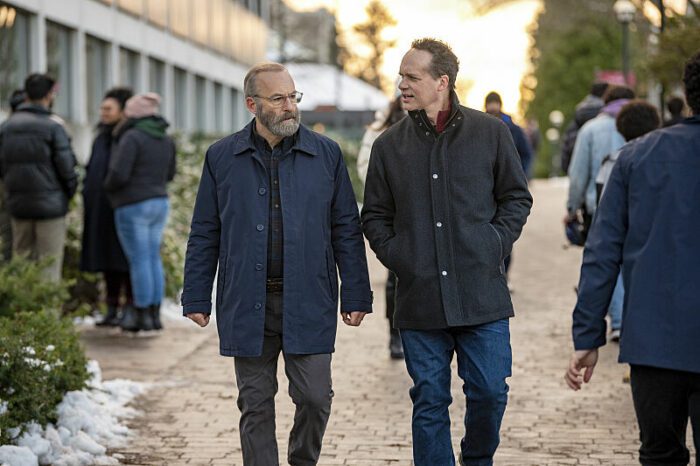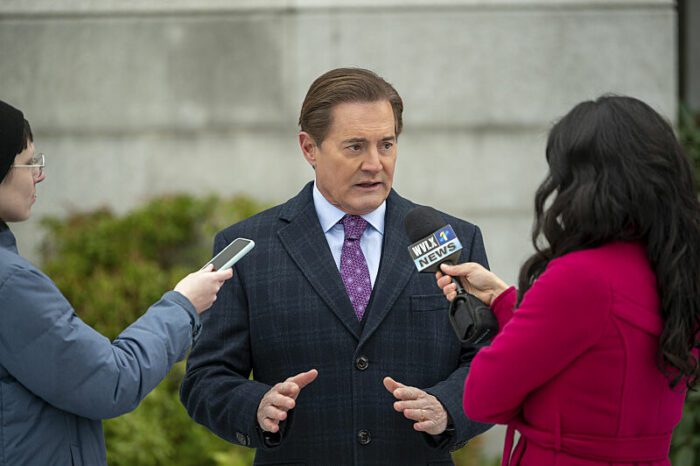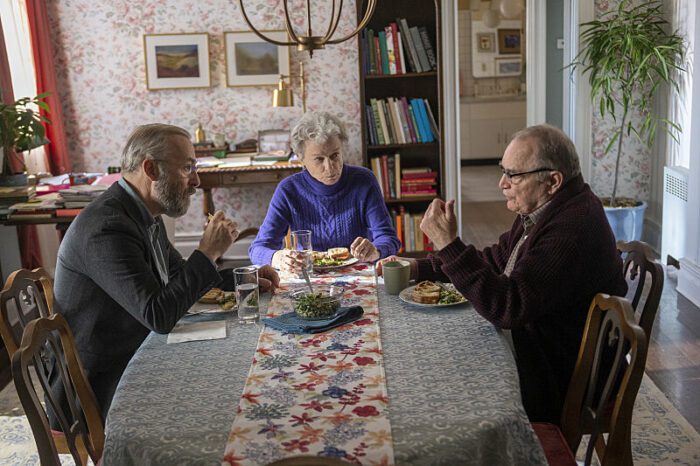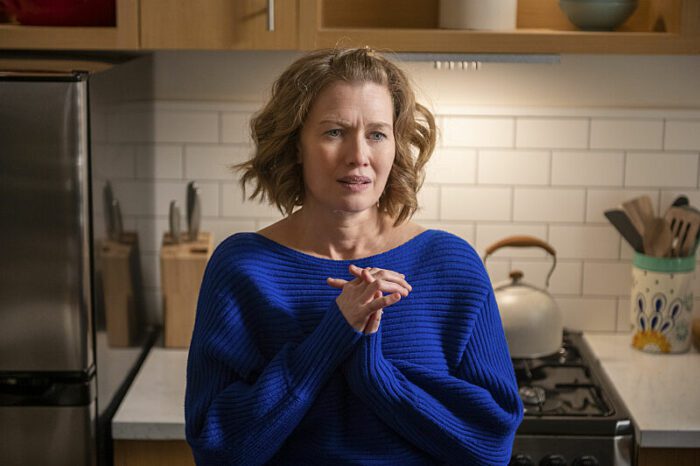The following recap contains spoilers for the Season 1 finale of Lucky Hank, S1E8, “The Chopping Block” (written by Paul Lieberstein and Aaron Zelman and directed by Nicole Holofcener)
Despite some stiff competition, this inaugural season of AMC’s Lucky Hank has been one of the hidden gems of the spring television season. It’s not as present in the monoculture as Succession or Yellowjackets, it doesn’t have the controversy of Barry, and it certainly doesn’t have the budget or spectacle of Silo or Citadel, but the heart and performances it brought to the table over the last eight episodes have been second to none. The first season concluded tonight with “The Chopping Block,” an episode where Hank was finally forced to confront the lingering issues that kept his relationships (and his urine) from flowing freely. And in true Hank Devereaux fashion, even the tie-a-bow-on-it happy ending is surrounded by an air of uncertainty and tension.
As Hank might have told us, we were “getting too happy, and I needed to do something about that.”
Several things have been hanging over Hank’s head these past seven episodes like geese flying around in the sky. President Dickie Pope is still badgering Hank for his list of the three English department colleagues that will be excised. Lily is actually moving to New York to take her dream job, and she and Hank still have not figured out how or if they are going to try and make the long-distance thing work. Julie and Russell’s relationship has devolved to the point that Russell is now living in a tent outside Hank’s house to try to win Julie back after his affair with Meg. And all the while, Hank’s father is still living in Railton at his mother’s house and has to be cared for like a child.

While I thought the ending to this episode was easily telegraphed, Hank took the scenic route to get there but still managed to assuage most of the uneasiness that has followed him all of these weeks. As the episode started I was sure that Hank would eventually realize there was one thing he could do to solve all of his problems.
If he were to just resign from Railton College, he would likely save at least one or two faculty jobs (department chairs typically make more money than a typical faculty member), he would be free to move to New York with Lily, and he would just trade places with his father who recently moved to Railton from New York. Those chapters of his life would be over and he could do what Paul suggested in Episode 5 and just “go to one of those stupid coffee shops and become one of those cliché writers.” Or, Hank could literally do nothing at all and just take a sabbatical from the world and relationships and bureaucracy, which is what it seems he wanted all along.
Hank eventually does get to that point, but not before coming up with a scheme that successfully ousts the apparently corrupt President Dickie Pope, and also saves all the faculty jobs at Railton. Hank and good buddy Tony confer with Jeffrey “Don’t Call Me Q” Epstein about the suspicious $10 million dollars that is the MacGuffin trail they must follow to figure out why so many faculty are getting laid off.

Epstein and Hank speculate that the new Epstein Building had the last $10 million financed (too many tax incentives!) after the $40 million donation from the eccentric billionaire was short that amount to be fully-funded. The $10 million didn’t need to come from existing faculty salary lines and was a means to a greater end all along. Pope, it turns out, has an unhealthy obsession with being the president of an Ivy League school or MIT, and he thought the financial restraint he was able to demonstrate would put him in their good graces.
The joke’s on you, Pope! The Ivy League schools have more than $200 billion in their endowments and can basically buy whatever they want. Needless to say, the board doesn’t respond well to being bamboozled and we are left to assume Pope’s boxes would be out on the curb waiting for him.
After his colleagues cycle through their emotions toward Hank in this episode (and this season), they want to celebrate with him, and finally count him as one of their own. He never had to box a goose to ensure the faculty were able to keep their jobs, all he had to do was punch out a Pope. But Hank wants none of it. “They’re only going to be happy with me for the first and last time,” he narrates. After saving their jobs and finally coaxing four good sentences out of student arch-nemesis Bartow Williams-Stevens, Hank turns in his resignation to Dean Rose.

For Hank it’s like driving through traffic, making it past one five-car pileup and knowing there are still two or three more of them to go before you reach your destination. He thinks the people he might want to share his accomplishments with would be his parents. Over lunch, he relays his good deeds, hoping to impress his father. After more than 25 years apart, Hank is proud of what he has done for his colleagues in the Humanities and thought—admittedly naively—that his father would appreciate something of that magnitude. All it does is send his father spiraling into complaints about why no one saved his job.
So what if William Devereaux was embellishing things at the end of his career such as his involvement in the Selma Civil Rights marches of 1965? That’s the price of admission in academia, right? “It was because of their system that pushed me to do it…I was taking well-earned licenses with my work!” All in the name of being able to keep publishing and securing invitations to conferences. According to Hank’s dad, “What else is there?”
Those words are the final nail in the coffin that gives Hank the permission he needs to leave Railton. He couldn’t impress his dad as a child. He couldn’t impress him with his own family. And he couldn’t even impress him with professional bona fides. What else is left but to finally run to the one thing that truly matters to him: his wife Lily.
Lily, fresh off setting up her new apartment in New York and running into Catherine Keener in the local coffee shop, can’t shake the melancholy feeling that she and Hank are moving further apart the more they run towards the things that they have been working towards professionally. Mireille Enos’ emotions and facial acting as Lily in this episode rise to meet all that Bob Odenkirk has done with Hank across the season. But she saves the best for last when about twenty different feelings wash across her face when she sees Hank show up at her apartment door.

But as we have come to ask ourselves with every minor triumph Hank Devereaux earns, will the happiness truly last? The last minute of the episode leaves us with lingering questions that we may or may not ever be able to answer, depending on what AMC decides to do with this show.
The last we saw Julie and Russell they were on opposite sides of a wall, with no resolution in sight. Dean Rose reads Hank’s resignation letter and summarily shreds it. Does he not accept it? Will he attempt to get Hank back after putting up such a good fight for the faculty? Hank and his father will seemingly never have the reckoning Hank wanted for so many years. In Hank’s words, he “finally found out what was more important than his family,” and it was his work. Hank does not want that ending to his story, so he chooses Lily.
But the last question we are left with is, has Lily chosen Hank? The last frame of the season has Lily looking pensive, cautious, and almost worried. Was she hoping for many perfect days in New York that don’t seem to include Hank?
Hank ends the episode happy, likely happier than he has ever been. Which, if the last seven episodes showed us anything, means some kind of despair is lurking right around the corner.

